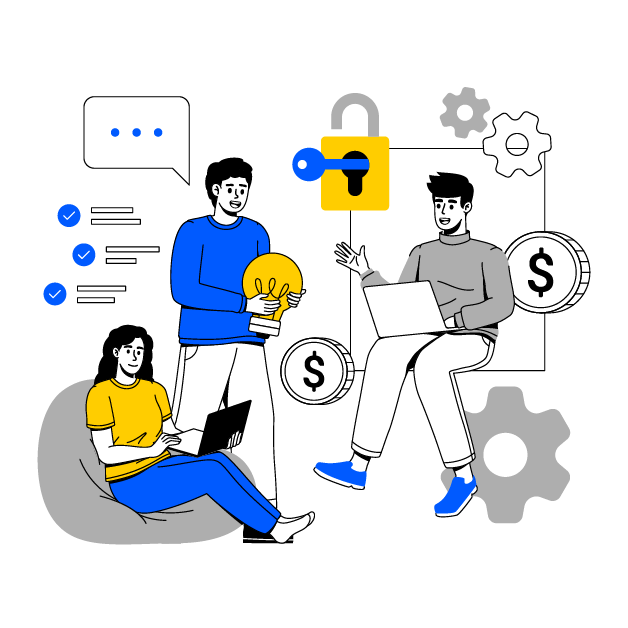For small and medium businesses (SMB), competing with enterprises often feels like a financial mismatch. Large companies have entire departments dedicated to accounting, reporting, and compliance — while SMB finance teams are expected to deliver the same level of accuracy and insight with fewer people, tighter budgets, and limited technology. But the playing field is changing. With outsourced accounting, businesses can now access the same caliber of financial expertise, advanced tools, and scalable processes that once only enterprise teams could afford.
Outsourcing isn’t about replacing your in-house team — it’s about extending your capacity, filling skill gaps, and giving your business enterprise-grade finance capabilities without enterprise overhead.
In this blog, we’ll explore how outsourced accounting empowers SMBs to compete head-to-head with larger rivals in the age of AI — from streamlining operations and strengthening compliance to unlocking data-driven insights that support smarter, faster decisions.
Outsourced Accounting in the Age of Agentic AI
gentic AI is one of the hottest terms in finance & accounting right now. The advent of agentic AI—autonomous, decision-making artificial intelligence—is reshaping the finance and accounting sectors. Unlike traditional automation or generative AI, agentic AI can autonomously execute complex tasks, adapt to new information, and collaborate with human professionals.
In simple terms:
Agentic AI refers to AI systems that can act like ‘agents’— not just giving recommendations (like ChatGPT does), but taking actions on their own within defined boundaries.
- In the finance & accounting context, this means:
- Automating end-to-end tasks, not just parts of them.
- Triggering workflows (e.g., matching invoices, posting journal entries, reconciling accounts) without waiting for human clicks.
- Monitoring exceptions and escalating only when needed.
- Learning from past corrections to continuously improve accuracy.
Applications in F&A:
- Accounts Payable: An agentic AI could receive an invoice, validate it against a PO, flag discrepancies, and even post the approved entry into the ERP — without manual intervention.
- Record-to-Report: AI agents could prepare reconciliations, detect anomalies, and draft closing entries.
- Order-to-Cash: They could follow up with customers automatically for overdue invoices and adjust reminders based on payment behavior.
- Audit Support: Instead of an analyst manually pulling samples, AI agents could fetch supporting documents, cross-check them, and prepare audit trails.
What Agentic AI Delivers for F&A?
- Efficiency: Reduces cycle times in O2C, P2P, and R2R.
- Cost Savings: Minimizes manual FTE effort.
- Accuracy: Less human error in reconciliations and reporting.
- Scalability: Handles high transaction volumes without additional headcount.
Evolving Role of Finance and Accounting Professionals
Automation has long supported finance by eliminating repetitive work and reducing errors — but it’s limited by static, rule-based execution. Agentic AI is a step-change. These systems act with initiative: learning from past cycles, adapting to new inputs, and taking action without waiting for explicit instructions.
By embedding initiative directly into digital systems, finance teams gain continuous momentum and agility — even when no one is actively at the controls.
As agentic AI transforms finance workflows, the role of finance professionals is evolving. Manual tasks are steadily diminishing, while the emphasis shifts toward understanding, validating, and interpreting the outputs of AI-driven systems.
The most valuable skills today include:
- Auditing and challenging algorithmic decisions
- Designing policies that guide responsible AI use
- Detecting bias or drift in financial models
- Communicating AI-informed insights to stakeholders in clear, actionable terms
Human oversight remains essential. Finance teams must supervise and refine the decision logic behind autonomous systems, ensuring accuracy, compliance, and trust. In this new environment, finance doesn’t just become more efficient — it becomes more strategic, ethical, and transparent, with accountability at the center of AI adoption.
For small and medium-sized businesses, as well as smaller accounting firms with lean teams, agentic AI acts like a force multiplier. It delivers round-the-clock expertise, stays up-to-date with changing tax laws, consistently applies accounting principles, and manages multiple specialties simultaneously. One AI agent can handle bookkeeping, another oversee tax compliance, and a third manage client communications/reporting — all working together seamlessly, like a well-coordinated, highly skilled team.
How SMBs Can Compete with Enterprise Finance Teams with AI?
Latest technologies, like AI, give SMBs the ability to punch above their weight — combining speed, accuracy, and insight to compete with enterprise finance teams on both operational efficiency and strategic foresight.
1. Leveling the playing field with automation
Enterprises rely on large finance teams, but SMBs can use AI to automate bookkeeping, reconciliations, and reporting — reducing workload and error risk while delivering enterprise-level efficiency without enterprise headcount.
2. Access to real-time insights
AI-powered dashboards and analytics give SMBs instant visibility into cash flow, AR/AP, and forecasting. This allows CFOs to make proactive decisions with the same speed and precision as their enterprise counterparts.
3. Strengthening compliance and audit readiness
AI systems can continuously monitor transactions, flag anomalies, and ensure records remain aligned with GAAP, IFRS, or tax requirements — helping SMBs maintain enterprise-grade compliance without the need for complex internal teams.
4. Smarter decision support
Beyond automation, agentic AI can learn from business data, recommend budget adjustments, or highlight revenue opportunities. This provides SMB leaders with strategic insights that previously required specialized analysts.
5. Cost efficiency and scalability
Unlike enterprises that absorb high overhead, SMBs can scale AI tools up or down affordably — accessing sophisticated finance capabilities on demand while keeping costs predictable.
The Trust Gap in AI Adoption
EY predicts that Agentic AI will be featured in 33% of enterprise software by 2028, resulting in 80% of customer service problems being solved independently, which will save 30% of the total costs by 2029. Moreover, IBM and Salesforce anticipate that one billion AI agents will be operational globally by the end of 2026. By 2029, it is predicted that 10% of global boards will seek guidance from AI for key executive decisions.
But challenges persist.
A poll by Deloitte says that “trust in agentic AI to support finance and accounting workflows — including the underlying data and programming of AI agents — emerged as the leading barrier to tool use (21.3%). Other challenges to agentic AI use include integration of AI into existing systems (20.1%) and lack of skilled personnel to operate AI agents (13.5%).”
Many finance leaders remain apprehensive about the security, privacy, and ethical challenges associated with AI adoption across sensitive and confidential financial processes. Accuracy and regulatory compliance are also top concerns in accelerating AI adoption. Rolling out agentic AI in finance is not just a software upgrade — it’s an integration challenge. These systems must connect seamlessly with accounting platforms, budgeting tools, procurement workflows, and compliance frameworks.
Most enterprises are taking a hybrid approach: layering agentic AI on top of existing ERP systems, allowing agents to observe, interact, and act without requiring the rewriting of core code. Others are going further, replacing legacy processes with fully AI-native systems.
Whichever approach is chosen, success hinges on strong foundations: secure APIs, well-defined data access rules, and governance processes that continuously audit agent actions. Without this structure, agentic AI can introduce new risks just as quickly as it delivers value.
A recent survey indicates that, despite a significant trust gap, AI is rapidly emerging as a key driver of transformation in financial leadership. US CFOs are in a strong position as early adopters of AI, poised to set the standard for financial leadership, compelling others to follow suit.
Why Outsource When You Can Adopt Agentic AI?
Even with the rise of agentic AI and other AI solutions, outsourcing continues to play a critical role. With strategic and smart outsourced accounting services, SMBs benefit from having a finance partner who not only leverages AI for efficiency but also brings domain knowledge, regulatory awareness, and business context to interpret results, manage exceptions, and ensure data security. This hybrid model gives SMBs enterprise-level efficiency without the overhead of building full teams in-house.
Here’s how outsourcing complements AI to help businesses optimize performance and outcomes.
1. Filling the expertise gap
AI handles automation and analytics, but it can’t replace human judgment. Outsourced finance teams bring seasoned accountants, controllers, and CFO-level advisors who can interpret AI insights, make nuanced decisions, and guide strategy — giving SMBs enterprise-grade expertise without the payroll burden.
2. Access to technology without heavy investment
Many outsourcing providers already use AI-driven tools for accounting, compliance, and reporting. By outsourcing, SMBs gain access to these advanced platforms without having to purchase, integrate, or maintain them directly.
3. Scalability during peak periods (like year-end close)
AI streamlines processes, but extra hands are often needed during crunch times. Outsourced teams can scale up support quickly, ensuring deadlines are met without compromising accuracy.
4. Enhanced compliance and data security
Outsourced accounting providers combine AI systems with strict governance, secure cloud platforms, and audit-ready processes. This provides SMBs with the compliance rigor of an enterprise finance team, while minimizing risks and lowering costs.
AI provides the speed and automation, while outsourcing adds expertise, scalability, and governance — together creating a powerful combination that enables SMB finance teams to compete head-to-head with enterprise rivals.
Turning Outsourced Teams into Enterprise-Grade Finance Hubs
Outsourcing is no longer limited to task execution. Many providers today operate as Global Capability Center (GCC) partners, providing SMBs and middle-market companies with access to the same scale, talent, and innovation hubs that large enterprises utilize.
With a GCC model, outsourcing firms don’t just handle bookkeeping or compliance — they build extended finance capabilities for SMBs and larger mid-market firms, integrating AI-powered tools, analytics, and specialized expertise into one cohesive system. This means businesses can tap into enterprise-level finance functions, such as advanced FP&A, risk management, and continuous compliance, without the overhead of building these teams in-house.
By partnering with outsourcing providers who act as GCCs, growing businesses gain a strategic edge: AI-driven efficiency, scalable global talent, and a unified finance backbone that helps them compete directly with enterprise finance teams.
Conclusion
For small and mid-sized businesses, competing with enterprise finance teams no longer requires matching them in headcount or overhead. By leveraging outsourced accounting, SMBs gain access to enterprise-grade expertise, advanced tools, and scalable processes—without the heavy investment. From sharper cash flow visibility and faster reporting to stronger compliance and strategic insights, outsourcing levels the financial playing field. In today’s competitive market, it’s not about the size of your finance team—it’s about the strength of your financial decisions. Outsourced accounting provides SMBs with the clarity, agility, and confidence to grow in line with larger players.
FAQS
No. AI automates tasks, but outsourced accounting ensures compliance, accuracy, and strategic insights AI alone can’t provide.
Automation speeds processes, while outsourced accountants interpret results, catch errors, and provide expert guidance.
Yes. It combines AI efficiency with expert oversight, reducing costs and avoiding errors.
Human oversight validates AI outputs, ensures compliance, and adds context to financial decisions.


